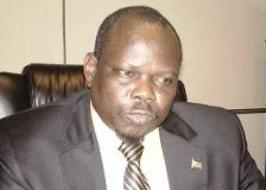SPLM will not accept any delay of Sudan’s elections
November 6, 2008 (KHARTOUM) — The Sudan People’s Liberation Movement (SPLM) warned that it would not accept any delay in the date of general elections scheduled for next year, as mandated by a landmark peace deal signed in January 2005.

On July 7, Sudanese MPs passed the National Elections Act of 2008, which lays the basis to run the first fair elections in the country since 1989, when the National Islamic Front seized power in a military coup led by the current president.
The legislators adopted a mixed electoral system. Sixty per cent of the 450 MPs will be chosen through majority vote in their geographical constituencies. Another 25% of the parliamentary seats are guaranteed to women and the remaining 15% of the members are chosen on the basis of proportional representation at the state level from separate and closed party lists.
The SPLM Secretary-General Pagan Amum yesterday told the European ambassadors in Khartoum that his party is ready to contest the general elections in 2009. He also warned that only the electoral commission has the authority to postpone or the cancel the election, but no other institution.
ACKNOWLEDGING POTENTIAL DELAYS
Amum for the first time echoed and confirmed statements by members of the two peace partners about potential delays, because he did not dismiss the postponement but said the Electoral Commission is the sole body authorized to take such a decision.
Actually, many obstacles make the run of the general elections virtually impossible before July 2009.
In the first place, there is a lack of political stability in the country due to the ongoing conflict in the western Sudan region of Darfur. Additionally, there are many laws that require revision before the election occurs, like press and national security bills, which legislators must pass, according to the CPA.
Sudan’s internal north-south border is still not yet defined and the mediation over the contested Abyei border area should be settled within six months.
The secretary-general presented several scenarios on the run or the delay of elections in light of the electoral law and the ongoing deliberations on the composition of the National Electoral Commission (NEC),
In accordance with the electoral law, the elections should be organised to take place six months after the establishment of the NEC. The members of the commission are not yet appointed. Last week the National Assembly decided to adjourn it after a troubled session.
There is also the question of weather, which must be considered in scheduling elections. Both preparations and elections need to take place during the dry season from November to April.
If the NEC is appointed by the parliament by the end of this month, it would begin its activities by December and it would be impossible to hold elections before November 2009, because it would be impossible for the NEC to finish its preparations before the current dry season ends.
(ST)
